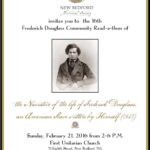SouthCoast civil rights trailblazers honored by local NAACP, Historical Society
SouthCoast civil rights leaders honored
March 21, 2015

Enola G. Aird , lawyer, activist mother and founder and president of Community Healing Network Inc. speaks at the NAACP Breakfast honoring the legacy of the 1965 Voting Rights Act. PHOTO BY DAVID W. OLIVEIRA/STANDARD-TIMES SPECIAL
NEW BEDFORD — The Waypoint Conference Center on the waterfront was full to capacity Saturday for a breakfast awards banquet by the local chapter of the NAACP and by the New Bedford Historical Society, with a sense of concern and urgency hanging over the proceedings.
This is the 50th anniversary of the Voting Rights Act, and the estimated 125 people in attendance heard speakers implore them not to let up on the effort to secure and protect voting rights. They were also reminded that 30 states have taken some measure of legislation to roll back voting rights and civil rights in recent years.
The spate of recent shootings involving blacks and police officers also got frequent mention, usually in combination with other threats to civil rights and voting rights.
Dr. Bruce Rose, the interim president of the local NAACP, cautioned “constant vigilance over the civil rights we’ve gained.” He called the backsliding “regressive elements” that threaten to undo much of the progress of the last half century.
The speeches, prayers and singing of “We Shall Overcome” were accompanied by awards to five residents who have done exemplary work on civil rights in SouthCoast.
Many speakers struck the same themes: First, that it’s critical that people register to vote and then actually vote; and second, that they join or rejoin the NAACP, to reestablish strength in numbers when it comes to getting the attention of elected officials.
The local NAACP chapter is part of the New England Area Conference, whose president, Juan Cofield, said, “If we forfeit our right to vote, we forfeit our right to complain,” which brought loud applause.
The keynote speaker was Enola G. Aird, a lawyer from Connecticut who has established the Community Healing Network, dedicated to teaching individuals to reject centuries of lies about themselves and “sign their own emancipation proclamation.”
She said blacks “have to free themselves of a false sense of inferiority,” and her goal is to have the personal emancipation spread across the country in about five years. Right now, she said, “racism has this country and the world firmly in its grasp.”
Other speakers included Mayor Jon Mitchell, who observed that “the Voting Rights Act didn’t get at the heart of endemic racism.” But on the positive side, he said, many cities have elected black mayors, which is something of a political resurgence.
Bristol District Attorney Thomas Quinn III told the gathering of how he first witnessed racism, and people fighting back against it, at age 8 during the 1968 election year in which Alabama Gov. George Wallace was a candidate making an appearance at Lincoln Park in Dartmouth.
Lee Blake, president of the New Bedford Historical Society, introduced the speakers and announced that a mural will soon be painted downtown to commemorate the famed all-black 54th Massachusetts Regiment, the first to be called up in the Civil War.
Follow Steve Urbon on Twitter @SteveUrbonSCT.




